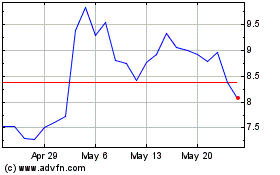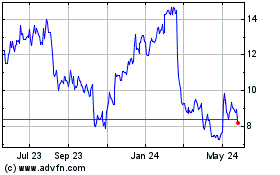Pulmonx Corporation (Nasdaq: LUNG) (“Pulmonx”), a global
leader in minimally invasive treatments for severe lung disease,
announced the presentation of clinical data from the AeriSeal®
CONVERT trial and 5-year follow-up data from the LIBERATE study at
the European Respiratory Society (ERS) Congress in Vienna, Austria.
Presented data from the CONVERT trial demonstrated that
treatment with the AeriSeal System is safe and effective in
occluding small airways and/or collateral air channels allowing
patients with collateral ventilation to undergo and benefit from
treatment with Zephyr® Endobronchial Valves. Presented 5-year
follow-up data from the LIBERATE study showed patients treated with
Zephyr Valves experience durable improvements in lung function out
to at least 5 years.
AeriSeal CONVERT Trial Professor Kaid Darwiche,
Head, Department of Interventional Pneumology, Ruhrlandklinik,
Essen, Germany gave a presentation titled, Zephyr Valve benefits
previously ineligible patients after blocking of collateral
channels with AeriSeal: CONVERT Trial. The reported data from the
full 101-patient cohort in the CONVERT trial demonstrated 77.6% of
patients with collateral ventilation (CV+) treated with AeriSeal
successfully experienced conversion. Furthermore, following
conversion, patients treated with Zephyr Valves experienced
clinically meaningful improvements over the baseline with:
- Improved lung function of 80mL or
10.2% over the baseline as measured by Forced Expiratory Volume in
1 second (FEV1)
- Improvement of 6.3 points in quality
of life measured by the St. George’s Respiratory Questionnaire
- Mean treated lobe volume reduction
(TLVR) of greater than one liter at 45 days
- 89% of CV- converted patients
achieved a TLVR equal to or greater than 350mL, the minimal
clinical important difference, at 6-months following valve
implantation
These findings show that patients with collateral ventilation
can successfully undergo bronchoscopic lung volume reduction (BLVR)
with Zephyr Valves following closure of the fissure gap with the
AeriSeal System.
“Treatment options beyond medical management for patients with
severe emphysema remain inadequate. Zephyr Valves, a minimally
invasive treatment option proven to improve patients’ ability to
breathe is not effective when collateral ventilation is present,”
explains Professor Darwiche. “We are excited about the opportunity
the AeriSeal System presents for patients who are collateral
ventilation positive to convert to collateral ventilation negative
status and become eligible for Zephyr Valves.”
“Pulmonx is meeting our commitment to develop and test
innovative technologies that help patients with severe lung disease
have a better quality of life,” said Steve Williamson,
President and Chief Executive Officer of Pulmonx. “We are
extremely encouraged by these results and look forward to
progressing further with our US IDE trial, CONVERT II, which is
expected to enroll through approximately the beginning of
2026.”
5-Year Follow-Up from LIBERATE Study Professor
Gerard Criner, Chair of Thoracic Medicine and Surgery at Temple
University in Philadelphia, PA, gave a presentation at the ERS
Congress titled, Five-Year Durability of Zephyr Valves in Patients
with Severe Emphysema. The 5-year follow-up data for the Zephyr
Valve treated patients from the LIBERATE study demonstrate durable
improvements out to at least 5 years. More specifically, the data
shows durable long-term benefits over the baseline with:
- Annual improvements in lung function
measured by FEV1 ranging from 109 mL in Year 1 to 79 mL at Year 5,
with an acceptable safety profile
- FEV1 improvement over the baseline
through year 5 is considered an advantage over maximal medical
treatment alone given the known decline in lung function over
time
- Similar or lower incidence of
respiratory adverse events or serious adverse advents (SAEs)
through Year 2 to Year 5 compared to Year 1 post-procedure
- No new types or increase in
frequency of respiratory SAEs compared to prior years
- 38% mortality over the 5-year
period, below the mortality of 49% in historical medically managed
control patients1
Also, at the ERS Congress, Dr. Frank Sciurba, Professor of
Medicine and Education and Director, Emphysema/ COPD Research
Center at the University of Pittsburgh School of Medicine,
Pittsburgh, PA, gave a presentation titled, Lobar Volume Reduction
of ≥50% with Zephyr Valves Correlates with Significant Reduction in
Longer-term Rate of Severe COPD Exacerbations. The post-hoc
analysis of the LIBERATE study data demonstrate that a TLVR of 50%
or above, following treatment with Zephyr Valves, is correlated
with significantly fewer severe COPD exacerbations requiring
hospitalization compared to the medically managed control group
over the long-term.
Professor Criner noted that, “The data demonstrate the
durability of treatment with Zephyr Valves out to at least 5 years
despite the progressive nature of lung disease for a large
population of COPD/emphysema patients with very few alternative
treatment options that do not involve major surgery.”
“We are pleased with the durability data shown in the 5-year
follow-up results from the LIBERATE study as our ever-growing body
of evidence further validates the clinical benefits of Zephyr
Valves for patients with severe emphysema and COPD,”
said Steve Williamson, President and Chief Executive Officer
of Pulmonx.
About the CONVERT TrialCONVERT is a
prospective, open-label, multi-center, international, single-arm
trial conducted at up to 20 investigational sites. The trial
enrolled 101 subjects with severe emphysema, and collateral
ventilation in the target lobe. The 101 enrolled subjects included
both heterogeneous and homogeneous emphysema subjects reflecting
current clinical practice. This protocol is designed to evaluate
the utility of the AeriSeal System, which uses a synthetic polymer
foam to occlude, or close, collateral air channels in a target lung
lobe and convert the target lung lobe to having little to no
collateral ventilation (CV-). Converted patients then underwent
Bronchoscopic Lung Volume Reduction with Zephyr Endobronchial
Valves. Zephyr Valves are not effective if collateral ventilation
(CV+) is present but once the treated lobe is converted from CV+ to
CV-, patients can be treated with Zephyr Valves which has been
shown to improve lung function, quality of life, and exercise
capacity for patients with severe COPD/emphysema.2 See
https://clinicaltrials.gov/ct2/show/NCT04559464 for more details on
the CONVERT trial.
The AeriSeal System has received a “Breakthrough Device”
designation by the Food and Drug Administration. It is not approved
by the FDA or approved for commercial sale in the United
States.
About the CONVERT II Pivotal TrialThe CONVERT
II Pivotal Trial is designed to evaluate the safety and
effectiveness of the AeriSeal System in limiting collateral
ventilation in severe COPD and emphysema patients. The trial will
enroll approximately 200 patients in and outside the United States.
Patients who experience conversion following the AeriSeal System
treatment will then be treated with Zephyr Valves per current
standard of care for lung volume reduction. Procedural success,
defined as lung volume reduction, and other clinical parameters
will be evaluated at six months post-valve treatment and will be
used to support the company’s premarket approval application.
About Zephyr ValvesThe Zephyr Endobronchial
Valve is a minimally invasive treatment option for severe
COPD/emphysema. Zephyr Valves are placed via bronchoscopy to block
off a diseased portion of the lung to prevent air from getting
trapped and reduce hyperinflation, which allows the healthier lung
tissue to expand and take in more air. This results in patients
being able to breathe easier, be less short of breath, and have an
improvement in their quality of life.2 National and global
treatment guidelines for COPD include Endobronchial Valves like
Zephyr Valves as a recommended treatment option for patients with
severe COPD/emphysema, with the Global Initiative for Chronic
Obstructive Lung Disease (GOLD) giving valves an ‘Evidence A’
rating. More than 40,000 patients have been treated with Zephyr
Valves worldwide.
About Pulmonx CorporationPulmonx
Corporation (Nasdaq: LUNG) is a global leader in minimally invasive
treatments for chronic obstructive pulmonary disease (COPD).
Pulmonx’s Zephyr® Endobronchial Valves, Chartis® Pulmonary
Assessment System and StratX® Lung Analysis Platform are designed
to assess and treat patients with severe emphysema/COPD who despite
medical management are still profoundly symptomatic. Pulmonx
received FDA pre-market approval to commercialize Zephyr Valves
following its designation as a “breakthrough device.” The Zephyr
Valve is commercially available in more than 25 countries, is
included in global treatment guidelines and is widely considered a
standard of care treatment option for improving breathing, activity
and quality of life in patients with severe emphysema. For more
information on the Zephyr Valves and the company, please visit
www.Pulmonx.com.
AeriSeal®, Chartis®, Pulmonx®, StratX®, and Zephyr® are
registered trademarks of Pulmonx Corporation.
Forward Looking StatementsThis release contains
forward‐looking statements within the meaning of Sections 27A of
the Securities Act of 1933 and Section 21E of the Securities
Exchange Act of 1934. We may, in some cases, use terms such as
“look forward,” “confident,” “promises,” “predicts,” “believe,”
“potential,” “anticipates,” “expects,” “plans,” “intends,” “may,”
“could,” “might,” “will,” “should,” or other words that convey
uncertainty of future events or outcomes to identify these
forward‐looking statements and include, without limitation,
statements about Pulmonx’s ability to treat a greater number of
patients and deliver significant benefits to patients.
Forward‐looking statements should not be read as a guarantee of
future performance or results and may not necessarily be accurate
indications of the times at, or by, which such performance or
results will be achieved. These forward‐looking statements are
based on Pulmonx’s current expectations and inherently involve
significant risks and uncertainties. Actual results and the timing
of events could differ materially from those anticipated in such
forward‐looking statements as a result of these risks and
uncertainties, which include, without limitation those related to
the safety, efficacy and patient and physician adoption of the
company’s products, the ability to fully enroll and the final
results and outcomes of clinical trials and studies involving the
Company’s products, the ability to obtain and maintain
reimbursement codes for its products, and the company’s ability to
procure and maintain required regulatory approvals for its
products. These and other risks and uncertainties are described
more fully in the section titled “Risk Factors” in Pulmonx’s
filings with the Securities and Exchange
Commission (SEC), including the Company’s Quarterly Report on
Form 10-Q filed with the SEC on August 2, 2024,
available at www.sec.gov. Pulmonx does not undertake
any obligation to update forward‐looking statements and expressly
disclaims any obligation or undertaking to release publicly any
updates or revisions to any forward‐looking statements contained
here/in.
References 1 Naunheim KS et al. Ann Thorac
Surg 2006; 82: 431– 443.2 Criner G et al. Am J Respir Crit Care
Med. 2018; 198 (9): 1151–1164.Media Contact:Marcee
Maroneymmaroney@pulmonx.com
Investor Contact:Brian JohnstonGilmartin
Groupinvestors@pulmonx.com
Pulmonx (NASDAQ:LUNG)
Historical Stock Chart
From Nov 2024 to Dec 2024

Pulmonx (NASDAQ:LUNG)
Historical Stock Chart
From Dec 2023 to Dec 2024




